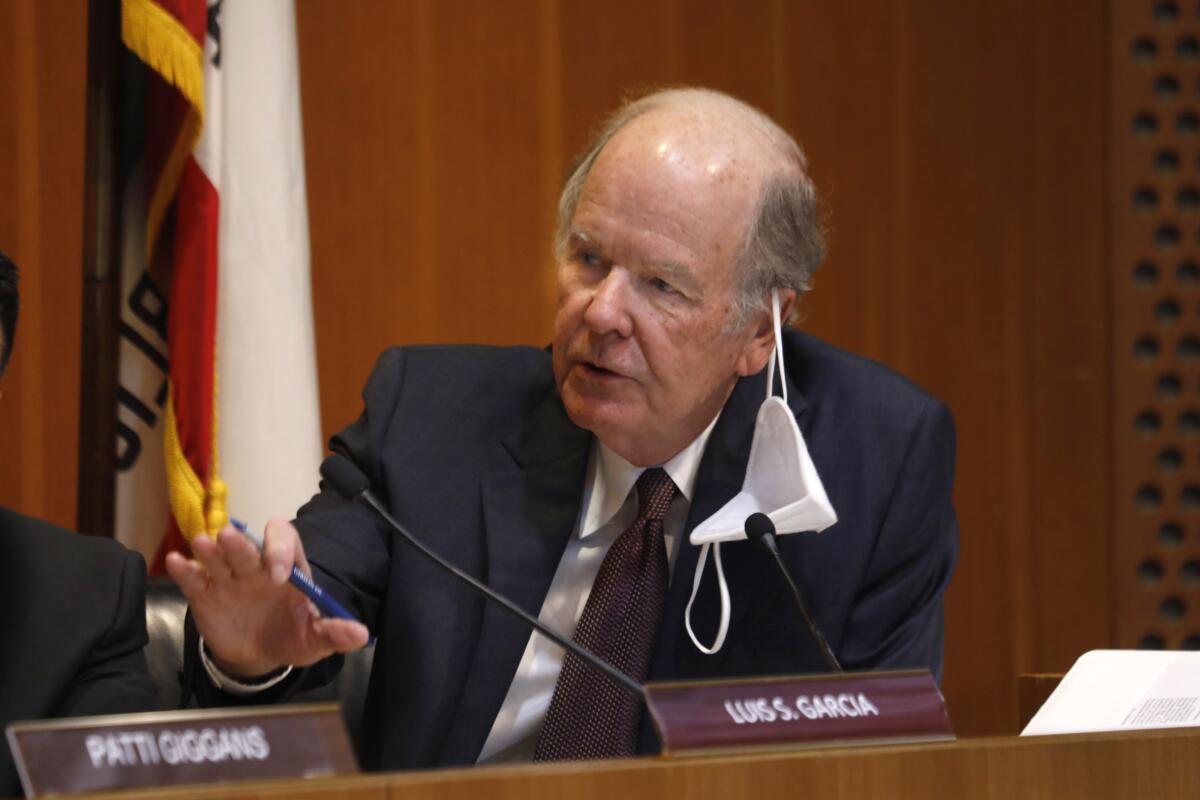Civilian oversight commission calls for sheriff to outlaw deputy gangs, ban their rituals

- Share via
A civilian oversight commission has called on the Los Angeles County Sheriff’s Department to ban deputy gangs and the tattoos that mark a deputy’s membership.
On Friday, after a special counsel report highlighted the continued existence of deputy gangs with names like Banditos and Executioners, the Los Angeles County Civilian Oversight Commission voted to recommend the wide-ranging reforms detailed in the report to Sheriff Robert Luna and the county Board of Supervisors.
Commissioner Robert Bonner said the 70-page special counsel report was historic and must lead to change. He noted the report’s finding that the deputy gangs have been a problem for at least 50 years, persisting despite other landmark investigations like the 2002 Kolts report and the 2012 report from the Citizens’ Commission on Jail Violence.
“Change must start now,” said Bonner, a former federal judge and head of the U.S. Drug Enforcement Administration under President George H. W. Bush. “I want to applaud and congratulate our special counsel, Mr. (Bert) Deixler, and his team for pulling together a no punches report ... that clearly lays out the horrific impact of the deputy culture, the deputy gang culture within the sheriff’s department and on its own personnel.”
The special counsel report found that at least half a dozen “gangs” or “cliques” of tattooed deputies are still active in the Sheriff’s Department, including the Regulators, Spartans, Gladiators, Cowboys and Reapers.
New groups may be forming as members retire, and “there is some evidence indicating that deputy cliques are re-emerging in the Los Angeles County jails,” the report said.
The gangs have created rituals that valorized violence, celebrating deputy shootings of civilians with “shooting parties” and recording the shootings in an official book, according to the report. Deputies who shot a civilian could add an embellishment to their basic gang tattoo.
Members had to make payments to deputy “shot callers,” who sometimes required them to inflict violence. The shot callers operated a shadow chain of command, controlling work assignments, rewarding their members and punishing those who spoke out against them, according to the report.
Challenging the shot callers could sometimes result in a rat on your doorstep or loosened lug nuts on your car, the special counsel told the commission Friday.
The vast majority of the sheriff’s department’s nearly 10,000 deputies are not involved in the gangs and are at risk of being victimized by them.
“They are a cancer. They harm the department generally, they harm the people who work for the department and they harm the public,” said Deixler, a former federal prosecutor who has argued before the U.S. Supreme Court.
In addition to urging a new anti-gang policy and the creation of an improved reporting process to notify prosecutors of a deputy’s gang membership, the report’s recommendations include firing captains who won’t support the changes and requiring deputies to hide their gang tattoos at work.
“We’re calling upon the sheriff to outlaw tattoos, unprofessional logos or other signifiers depicting violence — no new tattoos, no smoking gun tattoos, no Fort Apache logos, no ghetto birds, logos,” Deixler told the commission.
The special counsel report comes almost a year after the commission officially launched an independent investigation into deputy gangs. The aims were to figure out which groups still existed within the department, assess whether existing department policies had been effective in combating them and make recommendations on how to root them out.
The report also calls out those who could have done more to solve the problem — including the deputies union, county counsel and the district attorney’s office.
Luna, who took office in December, said he is looking forward to working with the commission on the issue, noting that he has already created a new office to “eradicate deputy gangs.”
Lael Rubin, one of two commissioners who voted against forwarding the recommendations, said she supported the report but wanted more time for two commissioners who were absent Friday to give their input.
“This has been a long time coming,” said Rubin, a former high-ranking L.A. County prosecutor. Former Sheriff Alex Villanueva “insisted from the beginning that there was not an issue with gangs in the sheriff’s department,” she noted.
In an email to The Times, Villanueva called the special counsel investigation “a sham from the start.”
“Now Sheriff Luna has to pretend to eradicate phantom deputy gang members who don’t exist,” he said.
Sean Kennedy, chair of the commission and former head of the federal public defender’s office in Los Angeles, said that while deputies feared the gangs, it was ultimately the public who suffered.
“We’ve seen a lot of them are repeat users of violence or repeat shooters, and it’s all hidden from us,” Kennedy said. “It’s terrible ... about the deputies who have suffered, but I think the community has suffered way more. They have lost their family members and been given no real explanation.”
At the commission meeting, residents expressed outrage that the deputy gangs were still operating, decades later.
Franky Carrillo said that 30 years ago, deputy gang members framed him for a murder he didn’t commit. He was exonerated after two decades in prison.
Still, Carrillo said he is grateful that finally, “the wheels of justice are turning in the right direction.”
“For the good or bad of it, any movement in the right direction is welcome, and I am really excited about it,” he added. “Justice needs to prevail.”
Times staff writer Keri Blakinger contributed to this report.
More to Read
Sign up for Essential California
The most important California stories and recommendations in your inbox every morning.
You may occasionally receive promotional content from the Los Angeles Times.










